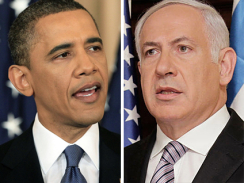 Barack Obama and Binyamin Netanyahu during their meeting in the Oval Office.
Barack Obama and Binyamin Netanyahu during their meeting in the Oval Office.Barack Obama, and�Israel's prime minister,�Binyamin Netanyahu, were at pains to demonstrate common ground on dealing with�Iran's nuclear programme. But their White House meeting on Monday failed to assuage or disguise deep Israeli unease about the ramifications of a possible rapprochement between Washington and�Tehran, and the overall direction of Obama's Middle East policy. In short, Israel is being squeezed in a tightening strategic vice.
Netanyahu has made no direct public comment about last week's highly successful charm offensive at the UN by Iran's new president, Hassan Rouhani, and his subsequent game-changing telephone conversation with Obama. But the Israeli leader vowed before arriving in the US to counter Iran's "onslaught of smiles". He was not expected to pull his punches when addressing the UN on Tuesday and has extended his US visit by a day to push his views in a series of media interviews.�
Netanyahu stuck to his old script at the White House. "Iran's conciliatory words have to be matched by real actions � transparent, verifiable, meaningful actions. Iran is committed to Israel's destruction," he said. He reiterated his�previous demands: "Iran must fully dismantle its military nuclear programme. If Iran continues to advance its military programme during negotiations, the sanctions should be strengthened."�
But the Israeli leader appeared to realise that Obama's revived emphasis on diplomatic solutions in both Iran and in Palestine � framed within Iran's apparently more moderate posture� has left him with little alternative, for now at least, but to go along with the US administration and to wait, perhaps, for the inevitable collapse that sooner or later usually attends such well-intentioned initiatives.�
While it was an achievement of sorts that a repeat of their 2011 Oval Office row, and any hint of open disagreement, were avoided, it was not a good day for Netanyahu. While reassuring his visitor that he would insist on substantive concessions before relaxing the pressure on Tehran, Obama avoided any mention of a timetable, or "red lines", or of any specific steps that Iran must take.
Like its European allies, the US does not believe a complete dismantling of Iran's nuclear programme is a realistic objective. Their emphasis instead is on curbing uranium enrichment and on expanded verification and inspection measures.�
Netanyahu's energetic bid, over the past three years, to convince the great powers that Iran is the world's number one security threat, akin to but more dangerous than North Korea, thus seems to have run into the sand. Nor do previous, veiled threats of Israeli military action against Iran's nuclear sites now appear to have any substance, as US opposition to any such action has stiffened with Obama's re-election and the technical and practical difficulties for Israel of mounting unilateral strikes have become clearer.�
Most Israelis � 78% � appear to share their prime minister's scepticism about Iran's change of heart, according�to a recent poll, as do numerous American and�Israeli commentators. Yet, ironically, the hawkish Netanyahu, a favourite target for American and European liberals, now finds himself under attack from Israel's political right for allegedly failing to stand up to Obama.�
Current and former members from far right and nationalist side of the Knesset have been voluble in their concern about Netanyahu's handling of both the Iranian and Palestinian issues. As the Jerusalem Post reported: "Likud MK Moshe Feiglin said Netanyahu's conception that the world will take action to prevent a nuclear Iran has collapsed. He said it was now clear to all that Iran will proceed toward a military nuclear capability and the US will not take action to stop it ... What Netanyahu needs to ask himself is not what Obama will do, but whether under his own watch, an extremist Muslim country that wants to destroy Israel like Iran will join the nuclear club... That's what history will judge him on. It is wrong to shift our security to the US. It shows we haven't learned anything."�
Former Knesset member Aryeh Eldad said Netanyahu and Obama were both "good actors," but the reality facing Israel was starkly clear. "Bibi [Netanyahu] gave up the Israel option for military action on Iran, and he is now relying on the US, which says we need to give up on the Palestinian issue in return," Eldad said. "He understands the fight is lost. He sacrificed the land of Israel."�
Deputy defence minister Danny Danon said Netanyahu was under an obligation to try and help Obama make the diplomatic route succeed. But he warned that the�Israeli right had been surprised�by the [1993] Oslo peace agreement and the [2005] Gaza withdrawal and did not want "another surprise".�
Its nuclear ambitions apart, Israel has a long list of grievances against Iran, starting with former president Mahmoud Ahmadinejad's repeated assertion that the state itself is illegitimate. Rouhani distanced himself from such talk but has said little to suggest an end to Iran's support for militant groups such as Hamas and Hezbollah, its backing for Bashar al-Assad's regime in Syria, its development of long-range missiles, its alleged complicity in terrorist attacks against Israeli targets, its cold war with the Sunni monarchies of the Gulf, its machinations inside Iraq, and its evident aspirations to regional superpower status.�
On the American side of the ledger, Israel has cause to worry that Obama's U-turn on military action in Syria means his threat of strikes on Iran, should diplomacy fail, is equally empty; that before leaving office he may try to force Netanyahu into the historic compromise on Palestine that he has hitherto successfully resisted; and that the White House is insufficiently appreciative of how deeply threatening is the current turmoil in Egypt and other Arab spring states to Israel's security.�
Netanyahu got a bruising reminder this week: between Iran and the US is Israel's hard place.
By The Guardian
The Iran Project is not responsible for the content of quoted articles.










